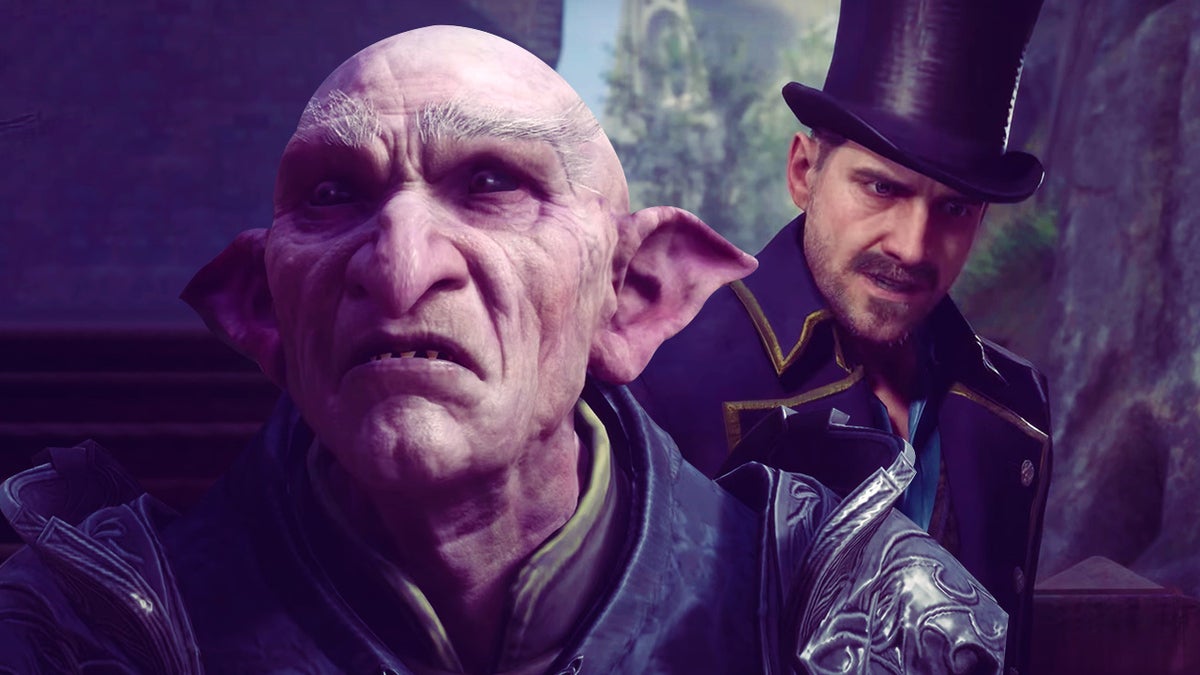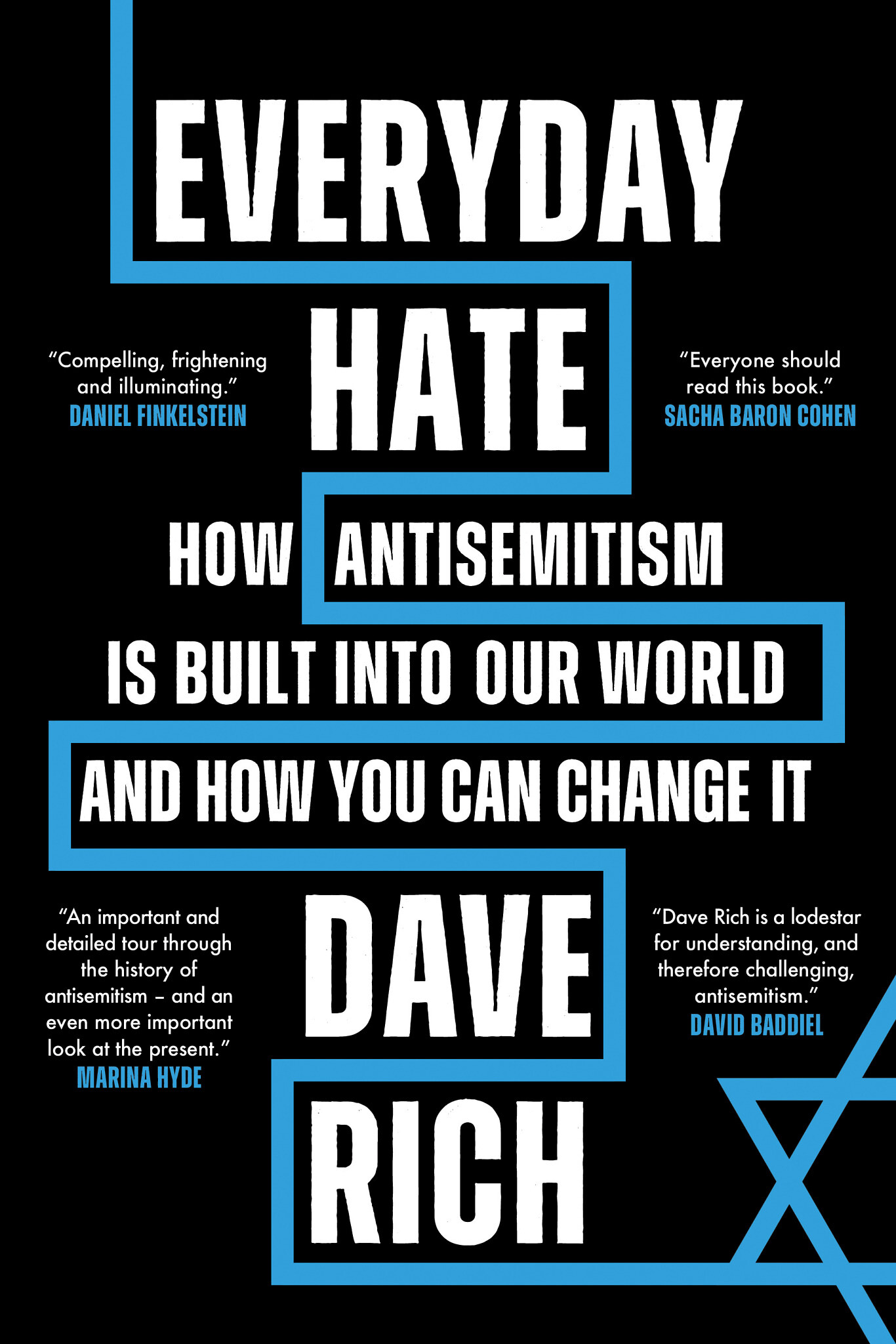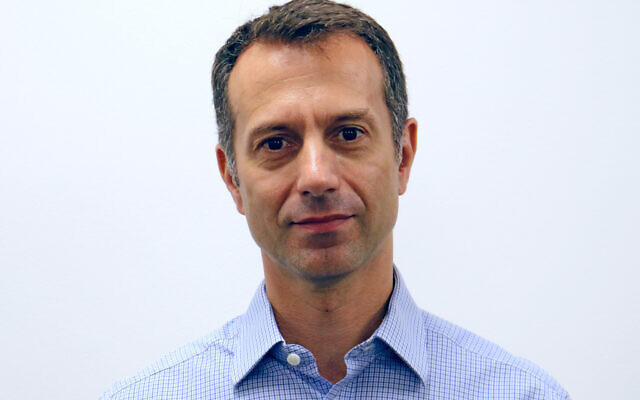‘Stereotypes are so common that people don’t realise they are being antisemitic’
The Community Security Trust's Dave Rich tackles modern-day Jew hatred in his new book and says we all have a role to play
Dave Rich starts his new book on antisemitism mulling the different types of Jew-hatred that have been in the news; a Nazi salute at a menorah, a Jewish boy punched on a bus by a woman shouting racist abuse, a student being chased down the road by men shouting: “We’ve got a knife, we’re going to get you, Jew.” That’s just page one.
There are several new antisemitism debates going on. JK Rowling haters are claiming the divisive author is antisemitic because the video game of her Harry Potter franchise features goblins.
Meanwhile American podcaster Joe Rogan told his millions of followers: “The idea that Jewish people are not into money is ridiculous. That’s like saying Italians aren’t into pizza.”
Both link ancient tropes about Jews with the most modern of things – a computer game and a podcast. This is why it is so important that the first half of Dave’s book Everyday Hate – How Antisemitism is Built into Our World and How You Can Change It explores these views of Jews, which are so embedded into society that it feels almost impossible to extricate them.
“All your readers will have come across these tropes,” says Dave, 52, an academic who has worked for CST for nearly 30 years. “I think the reason antisemitism keeps coming back is that it is so deeply wired into so many assumptions about how our world works. It is so deep in different parts of our culture; you can see it in low culture, high culture, left wing, right wing.
“Most of the time it is just on the fringes but certain things can trigger an upsurge in antisemitism and it can suddenly become mainstream. I think the idea of it being literally being built into the fabric of our world has to be the starting point for us to consider how we dismantle it.’

The goblin thing is a case in point about how antisemitism is part of our society. “A lot of these ideas are so deep and so old it is hard to know where the antisemitism starts and stops,” he says. “I don’t go along with this whole idea of antisemitism within Harry Potter. I think David Baddiel described it very well when he said we can take a goblin as simply a goblin but the reason why some people think a creature with a grotesque face and a big nose is Jewish is because that is how Jews have been depicted for centuries.
“But I am keen that we accept the world we live in; we don’t try to shame or cancel people. Antisemitism should be judged in context. JK Rowling is absolutely not antisemitic, quite the opposite. She’s been very supportive of the Jewish community.”

He finds Rogan’s comments more problematic. “If you ask anyone what they think when you say Jew, you will often get the word ‘money’ back. The association of Jews and money has created so much antisemitism, so much hatred and murderous treatment of Jews over the centuries that it’s not something the biggest podcaster in the world should be playing with.
“But it is an indication of how widespread these ideas are that they are treated as normal. I do think with Rogan, as we saw with Dave Chappelle [he joked about Jews running showbusiness: ‘It’s not a crazy thing to think but it’s a crazy thing to say out loud’] – there is this pretence that they don’t realise the power of offence. But really, they are quite enjoying the frisson of breaking the taboo and getting away with it in plain sight.
“On one hand these stereotypes are so common that sometimes people don’t realise they are being antisemitic but there are examples where you know they know exactly what they are doing and they are doing it to get a rise out of us.”
Dave, who was born in Manchester and now lives in North London, has some personal experience – as most of us probably have – about that everyday antisemitism from people who don’t appear to stop and think about what they are saying.
“I think there is an element where non-Jews are just unaware of the tropes that many of us will have experienced. One of the examples I put in my book which, even when I think about it, I shake my head, is when I was paying the bill at a restaurant in Finchley and I asked the waitress, ‘Do you get to keep the tip?’ And she said, ‘Yes, we do keep the tips here. Not like the last restaurant I worked at where the owners kept it. But they were Jewish and you know what they are like with money.’
“My jaw hit the floor. Mainly I was thinking, ‘You are in the middle of Finchley, a very Jewish area, of all places to come out with this.’ But you know when you have that split second moment of thinking, ‘do I say something or not?’ I found myself in this difficult position. If I gave her a good tip, would I be overcompensating? If I gave too little, would she think ‘tight Jew’? You can’t win.’
Dave is keen to stress that we live in a country that is still mainly safe for Jews and where most people don’t harbour antisemitism. But he is worried about the growing number of young people who believe conspiracy theories about Jews running the world.
 “Polls show that if you are under 40 you are much more likely to believe antisemitic conspiracy theories about Jews running the media and the banks because conspiracy theories are much more popular among young people. I do stress that the majority of people reject this stuff but the trend lines are not heading in the right direction.”
“Polls show that if you are under 40 you are much more likely to believe antisemitic conspiracy theories about Jews running the media and the banks because conspiracy theories are much more popular among young people. I do stress that the majority of people reject this stuff but the trend lines are not heading in the right direction.”
It is hard to answer the age-old problem of antisemitism but Dave has some thoughts about how we can change the direction of that trend. The first is better Holocaust education explaining how you don’t need to be a Nazi to be an antisemite. The second is for Jews to be recognised as an ethnic minority and to insist that antisemitism is part of any anti-racism training. And third is having Jewish people step up; meet people, argue with people, explain to people who we are rather than the Jew of their imagination.
“We are a small community and there are many parts of the country where there are no Jewish people at all,” he says. “We need to try and find more formal, structured and sustained ways to encourage regular human contact because that will break down a lot of these prejudices and stereotypes. That is something we can all do.”
Everyday Hate – How Antisemitism is Built into Our World and How You Can Change it is £20 and is available from all good bookshops £20 or direct from the publishers www.bitebackpublishing.com

Thank you for helping to make Jewish News the leading source of news and opinion for the UK Jewish community. Today we're asking for your invaluable help to continue putting our community first in everything we do.
For as little as £5 a month you can help sustain the vital work we do in celebrating and standing up for Jewish life in Britain.
Jewish News holds our community together and keeps us connected. Like a synagogue, it’s where people turn to feel part of something bigger. It also proudly shows the rest of Britain the vibrancy and rich culture of modern Jewish life.
You can make a quick and easy one-off or monthly contribution of £5, £10, £20 or any other sum you’re comfortable with.
100% of your donation will help us continue celebrating our community, in all its dynamic diversity...
Engaging
Being a community platform means so much more than producing a newspaper and website. One of our proudest roles is media partnering with our invaluable charities to amplify the outstanding work they do to help us all.
Celebrating
There’s no shortage of oys in the world but Jewish News takes every opportunity to celebrate the joys too, through projects like Night of Heroes, 40 Under 40 and other compelling countdowns that make the community kvell with pride.
Pioneering
In the first collaboration between media outlets from different faiths, Jewish News worked with British Muslim TV and Church Times to produce a list of young activists leading the way on interfaith understanding.
Campaigning
Royal Mail issued a stamp honouring Holocaust hero Sir Nicholas Winton after a Jewish News campaign attracted more than 100,000 backers. Jewish Newsalso produces special editions of the paper highlighting pressing issues including mental health and Holocaust remembrance.
Easy access
In an age when news is readily accessible, Jewish News provides high-quality content free online and offline, removing any financial barriers to connecting people.
Voice of our community to wider society
The Jewish News team regularly appears on TV, radio and on the pages of the national press to comment on stories about the Jewish community. Easy access to the paper on the streets of London also means Jewish News provides an invaluable window into the community for the country at large.
We hope you agree all this is worth preserving.






















